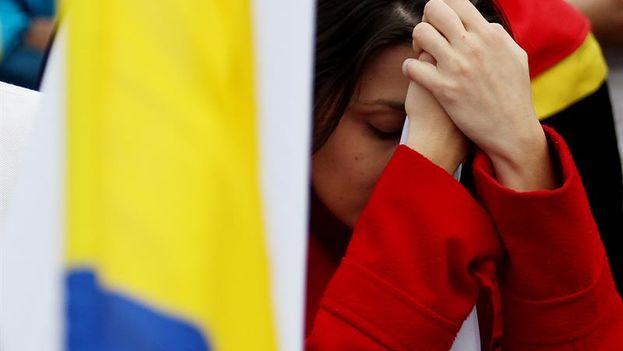
![]() 14ymedio, Reinaldo Escobar, Havana, 3 October 2016 — Encouraged by international support and the consensus of governments that support the agreements to achieve peace in Colombia, most of the media and experts predicted that the “Yes” side would win Sunday’s plebiscite. The results, however, have caused a shock in the region and a real earthquake on the front pages of newspapers.
14ymedio, Reinaldo Escobar, Havana, 3 October 2016 — Encouraged by international support and the consensus of governments that support the agreements to achieve peace in Colombia, most of the media and experts predicted that the “Yes” side would win Sunday’s plebiscite. The results, however, have caused a shock in the region and a real earthquake on the front pages of newspapers.
Some 50.2% of voters opted for “No” against 49.8% who inclined to “Yes.” Although it is a small difference and was affected by a high rate of abstentions — more than 60% — it shows that Colombians disagree with the terms of the negotiations and the results of the talks that have been taking place for years in Havana.
The long-awaited peace is now in a very difficult situation in which everything depends on what the signatories to the rejected agreement do or don’t do.
At this point, the pact needs to be revised under new principles. Some of these have already been set out by President Juan Manuel Santos in his first speech after learning of the failure of the plebiscite. The president has offered to maintain the bilateral ceasefire and revitalized his commitment not to give up until peace is achieved
Among the competing opinions explaining what happened, no one suggests that the rejection of the agreement is because the voters see it as too favorable to the government and too damaging to the Revolutionary Armed Forces of Colombia (FARC). Quite the contrary, the negative feedback is based, among other things, on the belief that the guerrillas received too many prerogatives and indulgences.
Those who opted for “No” reproach Santos for giving the guerrillas the same legitimacy as the state and for granting impunity in order to convert them to a political force.
The results seriously damage the guerrillas’ dreams of recycling themselves as a political party without having to pay for their crimes.
The question everyone is now asking is what is going to happen after the adverse outcomes to the agreement. The FARC have not surrendered their weapons, but have taken steps difficult to reverse. They are a failed guerrilla movement, with no future and with little popularity.
The lesson for us this Sunday is that people do not seem willing to pay any price for peace, especially if the cost includes renouncing their desire for justice.
Among the losers of this plebiscite are also the entire international community and, in particular, the Government of Cuba, which was not only a neutral guarantor but a driver of the demands of the guerrillas. Raul Castro convinced the FARC Commander in Chief Rodrigo Londoño Echeverri, known as Timochenco, to yield in some respects and promised the government negotiators that the FARC leader would honor the pact. This Sunday Colombians have also voted against Cuba’s general-president.
